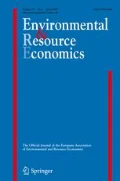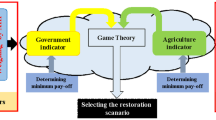Abstract
This paper investigates how cooperation among users can achieve a better management of groundwater in the presence of environmental externalities. Cooperation allows users to internalize the damages caused by their activities and reduce extractions. The paper develops a game theoretical framework to assess the value of cooperation in an aquifer that is divided into three sub-aquifers that are being overly exploited. Two types of externalities are modeled: first, water extractions in each sub-aquifer impact water levels in neighboring sub-aquifers (extraction externality). Second, the three sub-aquifers are also connected to an ecosystem and thus decisions in each sub-aquifer affect the health of the ecosystem (environmental externality). A cooperative game theory model is applied. The model empirically shows how the uncontrolled extractions in each sub-aquifer affects neighboring groundwater users but also cause severe impacts to the linked ecosystem. The model is tested empirically in one of the most important aquifers in Spain, the Eastern la Mancha aquifer. The results illustrate how both extraction and environmental externalities interact in affecting the likelihood of cooperation among the users. The paper estimates the value of cooperation and its stability with and without the environmental externality.
Similar content being viewed by others
References
Anderson G, Opaluch J, Sullivan WM (1985) Nonpoint agricultural pollution: pesticide contamination of groundwater supplies. Am J Agric Econ 67: 1238–1246
Balmford A, Bruner A, Cooper P, Costanza R, Farber S, Green RE, Jerkins M, Jefferiss P, Jessamy V, Madden J, Munro K, Myers N, Naeem S, Paavola J, Rayment M, Rosendo S, Roughgarden J, Trumper K, Turner RK (2002) Economic reasons for conserving wild nature. Science 297: 950–953
Barbier EB (1993) Valuing tropical wetland benefits: economic methodologies and applications. Geogr J Part I 59: 22–32
Barbier EB (2000) Valuing the environment as input: review of applications to mangrove-fishery linkages. Ecol Econ 35: 47–61
Barbier EB, Acreman M, Knowler D (1997) Economic valuation of wetlands: a guide for policy makers and planners. Ramsar Convention Bureau, Gland, Switzerland
Bateman I, Willis K, Garrod G (1994) Consistency between contingent valuation estimates: a comparison of two studies of UK National Parks. Reg Stud 28(5): 457–474
Bendor T (2009) A dynamic analysis of the wetland mitigation process and its effects on no net loss policy. Landsc Urban Plan 89: 17–27
Brander LM, Florax R, Vermaat JE (2006) The empirics of wetlands valuation: a comprehensive summary and a meta-analysis of the literature. Environ Resour Econ 33: 223–250
Brouwer R, Langford IH, Bateman IJ, Tuner RK (1999) A meta-analysis of wetland contingent valuation studies. Reg Environ Change 1(1): 47–57
Castaño S, Sanz D, Gómez-Alday JJ (2010) Methodology for quantifying groundwater abstractions for agriculture via remote sensing and GIS. Water Resour Manage 24: 795–814
Coase R (1960) The problem of social cost. J Law Econ 3: 1–44
Costanza R, Farber SC, Maxwell J (1989) Valuing and management of wetland ecosystems. Ecol Econ 1: 335–361
De Groot R, Stuip M, Finlayson M, Davidson N (2006) Valuing wetlands: guiance for valuing the benefits derived from wetland ecosystem services. Gland, Switzerland: Ramsar Technical Report No. 3. CBD Technical Series No. 27
Dinar A (1994) Impact of energy costs and water resource availability on agriculture and groundwater quality in California. Resour Energy Econ 16: 47–66
Dinar A (2001) Scale and equity in water resources development: a nash bargaining model. Nat Resour Model 14(4): 477–494
Dinar A, Howitt RE (1997) Mechanisms for allocation of environmental cost: empirical tests of acceptability and stability. J Environ Manag 49: 183–203
Dinar A, Wolf A (1997) Economic and political considerations in regional cooperation models. Agric Resour Econ Rev 26(1): 7–22
Dinar A, Xepapadeas A (1998) Regulating water quantity and quality in irrigated agriculture. J Environ Econ Manag 54: 273–290
Dinar A, Yaron D, Kannai Y (1986) Sharing regional cooperative gains from reusing effluent for irrigation. Water Resour Res 22(3): 339–344
Dinar A, Dinar S, McCaffrey S, McKinney D (2007) Bridges over water: understanding transboundary water conflicts, negotiation and cooperation. World Scientific Publishers, Singapore
Dufournaud CM, Harrington JJ (1990) Temporal and spatial distribution of benefits and costs in river-basin schemes: a cooperative game approach. Environ Plan 22: 615–628
Esteban E, Albiac J (2011) Groundwater and ecosystems damages: questioning the Gisser-Sánchez effect. Ecol Econ 70: 2062–2069
Gardner R, Moore M, Walker J (1997) Governing a groundwater commons: a strategic and laboratory analysis of western water law. Econ Inq 35: 218–234
Gordon HS (1954) The economic theory of a common-pool property resource: the fishery. J Polit Econ 62: 124–142
Gren IM (1995) The value of investing in wetlands for nitrogen abatement. Eur Rev Agric Econ 22: 157–172
Gura EY, Maschler MB (2008) Insights into game theory. An alternative mathematical experience. Cambridge University Press, Cambridge
Gürlük S, Rehber E (2008) A travel cost study to estimate recreational value of a bird refuge at Lake Manyas, Turkey. J Environ Manag 88: 1350–1360
Hanley N, Craig S (1991) Wilderness development decisions and the Krutilla-Fisher model: the case of the Scotland flow country. Ecol Econ 4(2): 145–164
Harsanyi JC (1959) A bargaining model for the cooperative n-person game. In: Tucker AW, Luce RD (eds) Contributions to the theory of games. Princeton University Press, Princeton, pp 1–4
Heimlich RE, Wiebe KD, Claassen R, Gadsby D, House RM (1998) Wetlands and agriculture. Private interests and public benefits. Agricultural Economic Report, no 765. United Sates Department of Agriculture (USDA)
Howitt RE, Msangi S, Reynaud A, Knapp KC (2005) Estimating inter-temporal preferences in natural resource management. Am J Agric Econ 87: 969–983
Judez L, de Andres R, Perez C, Urzainqui E, Ibañez M (2000) Influence of bid and subsample vectors on the welfare measure estimate in dichotomous choice contingent valuation: evidence from a case-study. J Environ Manag 60: 253–265
Judez L, Ibañez M, Perez C (2002) Valoración del use recreativo de un humedal español. Tests y comparación de diferentes métodos de valoración. Estudios Agrosociales y Pesqueros 192: 83–104
Leschine TM, Wellman KF, Green TH (1997) The economic value of wetlands: Wetlands’ role in floodprotection in Western Washington. Ecology Publication no. 97-100. Washington State Department of Ecology
Llamas R (1998) Conflicts between wetland conservation and groundwater exploitation: two case histories in Spain. Environ Geol Water S11: 241–251
Locáiciga HA (2002) Sustainable ground-water exploitation. Int Geol Rev 44: 1115–1121
Locáiciga HA (2004) A game-theoretic approach to ground-water extraction. J Hydrol 297: 22–33
Loehman E (1995) Cooperative solutions for problems of water supply. In: Dinar A, Loehman E (eds) Water quantity/quality management and conflict resolution: institutions, processes, and economic analysis. Greenwood Publishing Group, Westport
Loehman E, Orlando J, Tschirhart J, Whinston A (1979) Cost allocation for a regional wastewater treatment system. Water Resour Res 15: 193–202
Madani K, Dinar A (2011) Cooperative institutions for sustainable management of common-pool resources. Water Science and Policy Center Working Paper 02-0311. Available at: http://wspc.ucr.edu/WSPC_WP_02_0311%20coop%20inst%20com%20pool.pdf
Martin de Santa Olalla F, Dominguez A, Ortega F, Artigao A, Fabeiro C (2007) Bayesian networks in planning a large aquifer in Eastern Mancha, Spain. Environ Modell Softw 22: 1089–1100
Martínez-Santos P, de Stefano L, Llamas R, Martínez-Alfaro PE (2008) Wetland restoration in the Mancha Occidental aquifer, Spain: a critical perspective on water, agricultural, and environmental policies. Restor Ecol 16: 511–521
Milliman JW (1956) Commonality, the price system, and use of water supplies. South Econ J 22: 426–437
Ming J, Xian-guo L, Lin-shu X, Li-juan C, Shouzheng T (2006) “Flood mitigation benfit of wetland soil— a case study in Momoge National Reserve in China”. Ecol Econ 61: 217–223
Nash JF Jr (1953) Two-person cooperative games. Econometrica 21: 128–140
Negri DH (1989) The common property aquifer as a differential game. Water Resour Res 25: 9–15
Negri DH (1990) Stragedy of the commons. Nat Resour Model 4: 521–537
Ostrom E (1990) Governing the commons: the evolution of institutions for collective action. Cambridge University Press, Cambridge
Ostrom E (2010) Beyond markets and states: polycentric governance of complex economic systems. Am Econ Rev 100: 641–672
Pigou A (1920) The economics of welfare. Macmillan, New York
Polasky S, Tarui N, Ellis GM, Mason CF (2006) Cooperation in the commons. Econ Theor 29: 71–88
Pongkijvorasina S, Roumasset J, KaeoDuartec T, Burnett K (2010) Renewable resource management with stock externalities: coastal aquifers and submarine groundwater discharge. Resour Energy Econ 32(3): 277–291
Provencher B, Burt O (1993) The externalities associated with the common property exploitation of groundwater. J Environ Econ Manag 24: 139–158
Roseta-Palma C (2002) Groundwater management and endogenous water quality. J Environ Econ Manag 44: 93–105
Roumasset JA, Wada CA (2010) Optimal and sustainable groundwater extraction. Sustainability 2: 2676–2685
Rubio JS, Casino B (2001) Competitive versus efficient extraction of a common property resource: the groundwater case. J Econ Dyn Control 25: 1117–1137
Ruitenbeek HJ (1994) Modelling economy-ecology linkages in mangroves: economic evidence for promoting conservation in Bintuni Bay. Indonesia. Ecol Econ 10: 233–247
Salazar R, Szidarovszky F, Coppola E, Rojano A (2007) Application of game theory for a groundwater conflict in Mexico. J Environ Manag 84: 560–571
Sanz D, Gómez-Alday JJ, Castaño S, Moratalla A, de las Heras J, Martínez-Alfaro PE (2009) Hydrostratigraphic framework and hydrogeolocigalbehaviour of the Mancha oriental system (SE Spain). Hydrogeol J 17: 1375–1391
Sanz D, Castaño S, Cassiraga E, Sahuquillo A, Gómez-Alday JJ, Peña S, Calera A (2011) Modeling aquifer-river interactions under the influence of groundwater abstractions in the Mancha oriental system (SE Spain). Hydrogeol J 19: 475–487
Seidl AF, Moraes AS (2000) Global valuation of ecosystem services: application to the Pantanal da Nhecolandia, Brazil. Ecol Econ 33(1): 1–6
Shapley LS (1953) A value for n-person games. In: Kuhn HW, Tucker AW (eds) Contributions to the theory of games, no. II. Annals of Math. Studies, vol 28. Princeton University Press, Princeton, pp 307–317
Shapley LS, Shubik M (1954) A method for evaluating the distribution of power in a committee system. Am Polit Sci Rev 48: 787–792
Sobuhi M, Mojarad E (2010) Application of game theory for groundwater resources management of Atrak. J Econ Agric Dev 24(1): 1–12
Tarui N, Mason CF, Polasky S, Ellis G (2008) Cooperation in the commons with unobservable actions. J Environ Econ Manag 55: 37–51
Tsur Y (1990) Stabilization role of groundwater when surface water supplies are uncertain: the implications for groundwater development. Water Resour Res 26: 811–818
Tsur Y, Zemel A (1995) Uncertainty and irreversibility in groundwater resource management. J Environ Econ Manag 29: 149–161
Wattage P, Mardle S (2008) Total economic value of wetland conservation in Sri Lanka identifying use and non-use values. Wetl Ecol Manag 16: 359–369
White AT, Ross M, Flores M (2000) Benefits and costs of coral reef and wetland management, Olango Island, Philippines. In: Cesar HSJ (ed) Collected essays on the economics of coral reefs. Cordio, Sweden
Woodward RT, Wui YS (2001) The economic value of wetland services: a meta-analysis. Ecol Econ 37: 257–270
Yadav S (1997) Dynamic optimization of nitrogen use when groundwater contamination is internalized at the standard in the long run. Am J Agric Econ 79: 931–945
Author information
Authors and Affiliations
Corresponding author
Rights and permissions
About this article
Cite this article
Esteban, E., Dinar, A. Cooperative Management of Groundwater Resources in the Presence of Environmental Externalities. Environ Resource Econ 54, 443–469 (2013). https://doi.org/10.1007/s10640-012-9602-2
Accepted:
Published:
Issue Date:
DOI: https://doi.org/10.1007/s10640-012-9602-2
Keywords
- Cooperation
- Non-cooperation
- Externalities
- Common-pool resources
- Groundwater management
- Ecosystem
- Game theory
- Shapley value
- Nash-Harsanyi solution
- Core
- Public choice




